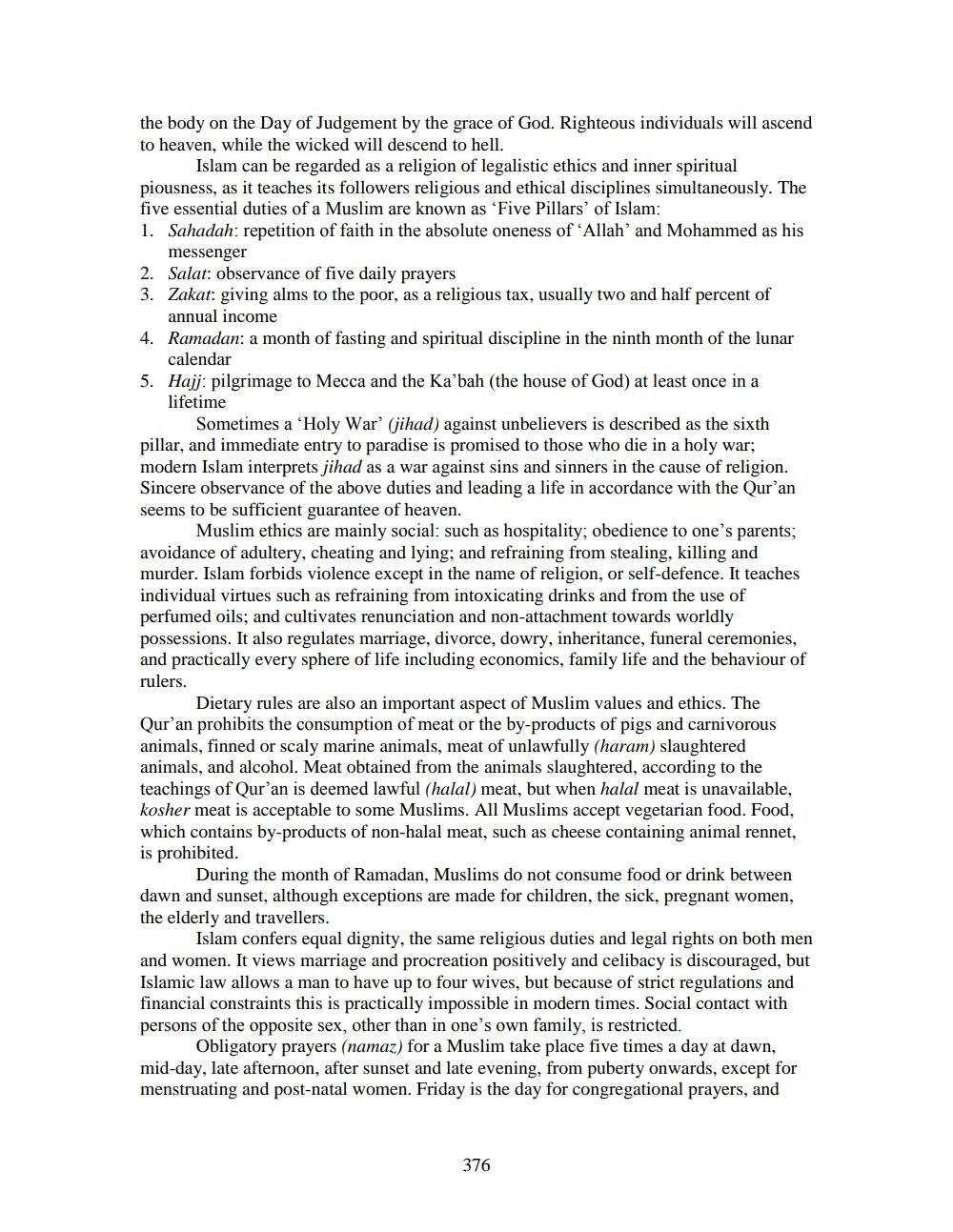________________
the body on the Day of Judgement by the grace of God. Righteous individuals will ascend to heaven, while the wicked will descend to hell.
Islam can be regarded as a religion of legalistic ethics and inner spiritual piousness, as it teaches its followers religious and ethical disciplines simultaneously. The five essential duties of a Muslim are known as 'Five Pillars of Islam: 1. Sahadah: repetition of faith in the absolute oneness of 'Allah' and Mohammed as his
messenger 2. Salat: observance of five daily prayers 3. Zakat: giving alms to the poor, as a religious tax, usually two and half percent of
annual income 4. Ramadan: a month of fasting and spiritual discipline in the ninth month of the lunar
calendar 5. Hajj: pilgrimage to Mecca and the Ka'bah (the house of God) at least once in a lifetime
Sometimes a 'Holy War(jihad) against unbelievers is described as the sixth pillar, and immediate entry to paradise is promised to those who die in a holy war; modern Islam interprets jihad as a war against sins and sinners in the cause of religion. Sincere observance of the above duties and leading a life in accordance with the Qur'an seems to be sufficient guarantee of heaven.
Muslim ethics are mainly social: such as hospitality, obedience to one's parents; avoidance of adultery, cheating and lying; and refraining from stealing, killing and murder. Islam forbids violence except in the name of religion, or self-defence. It teaches individual virtues such as refraining from intoxicating drinks and from the use of perfumed oils; and cultivates renunciation and non-attachment towards worldly possessions. It also regulates marriage, divorce, dowry, inheritance, funeral ceremonies, and practically every sphere of life including economics, family life and the behaviour of rulers.
Dietary rules are also an important aspect of Muslim values and ethics. The Qur'an prohibits the consumption of meat or the by-products of pigs and carnivorous animals, finned or scaly marine animals, meat of unlawfully (haram) slaughtered animals, and alcohol. Meat obtained from the animals slaughtered, according to the teachings of Qur'an is deemed lawful (halal) meat, but when halal meat is unavailable, kosher meat is acceptable to some Muslims. All Muslims accept vegetarian food. Food, which contains by-products of non-halal meat, such as cheese containing animal rennet, is prohibited.
During the month of Ramadan, Muslims do not consume food or drink between dawn and sunset, although exceptions are made for children, the sick, pregnant women, the elderly and travellers.
Islam confers equal dignity, the same religious duties and legal rights on both men and women. It views marriage and procreation positively and celibacy is discouraged, but Islamic law allows a man to have up to four wives, but because of strict regulations and financial constraints this is practically impossible in modern times. Social contact with persons of the opposite sex, other than in one's own family, is restricted.
Obligatory prayers (namaz) for a Muslim take place five times a day at dawn, mid-day, late afternoon, after sunset and late evening, from puberty onwards, except for menstruating and post-natal women. Friday is the day for congregational prayers, and
376




